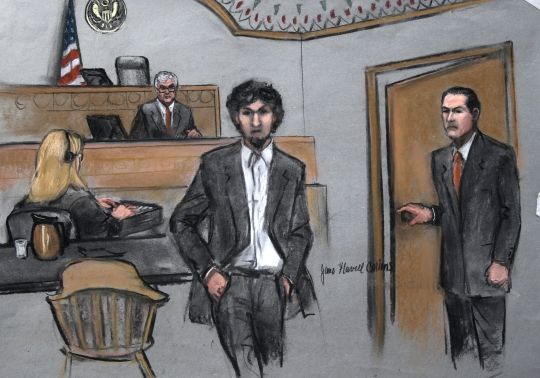 After a trial that lasted over two months, a federal jury needed just 14 hours of deliberations to come to the unanimous decision that Dzhokhar Tsarnaev should be executed. Tsarnaev, who along with his brother, Tamerlan, planted bombs at the 2013 Boston Marathon, did not express any emotion in the courthouse as the verdict on his punishment was announced late this afternoon. In the immediate aftermath of the ruling, newly appointed Attorney General Loretta Lynch called the sentence “a fitting punishment for this horrific crime."
After a trial that lasted over two months, a federal jury needed just 14 hours of deliberations to come to the unanimous decision that Dzhokhar Tsarnaev should be executed. Tsarnaev, who along with his brother, Tamerlan, planted bombs at the 2013 Boston Marathon, did not express any emotion in the courthouse as the verdict on his punishment was announced late this afternoon. In the immediate aftermath of the ruling, newly appointed Attorney General Loretta Lynch called the sentence “a fitting punishment for this horrific crime."
Tsarnaev, who was 19 years old at the time of the bombing, will soon be moved to the federal death row penitentiary in Terre Haute, Indiana.
As I watched the trial up close, this outcome seemed preordained. The government was set on the death penalty, and today they achieved that goal.
Before the start of the trial, Tsarnaev's lawyers had made repeated entreaties to settle the case with a sentence of life imprisonment without parole. These were denied by the government despite widespread opposition within the city of Boston to executing him, and mitigating factors which strongly suggested that Dzhokhar played a secondary role in the crime and the events leading up to it.
Presiding Judge George O'Toole made decisions throughout the process which seemed to ensure it would be more a public spectacle than the impartial administration of justice. (O'Toole also tried the case of Tarek Mehanna, and sentenced him to 17 years imprisonment for translating an al Qaeda document on the Internet.) Defense lawyers submitted numerous desperate requests to move the trial from Boston, on the grounds that it would be impossible for Dzhokhar to get a fair hearing there. These were all summarily dismissed. O'Toole also declined defense requests that he explain to the jury that if they failed to reach a unanimous verdict on Tsarnaev's punishment, he would not be obligated to declare a mistrial — as he would have been if they had not been unanimous on Tsarnaev's guilt — but instead would be obliged to administer a life sentence.
In an op-ed published in The Boston Globe several weeks before today's verdict, the family of 8-year-old Martin Richard asked that Tsarnaev not be given the death penalty. Their reason was not necessarily borne of compassion for Tsarnaev, but rather a desire that they should be allowed to move on with their own lives. Writing that “the continued pursuit of [death] could bring years of appeals and prolong reliving the most painful day of our lives," the family asked prosecutors to settle on life imprisonment without parole. Richard's family was in the courthouse today and saw Dzhokhar sentenced to death.
Given the pain it will cause the families of the victims, and the opposition within the city of Boston to such an outcome, why did the government seek the death sentence in this case? As Boston U.S. Attorney Carmen M. Ortiz said in her statement today, the execution of Dzhokhar will send a message that “we are not intimidated."
Source: firstlook.org
 В Атырау -10
В Атырау -10